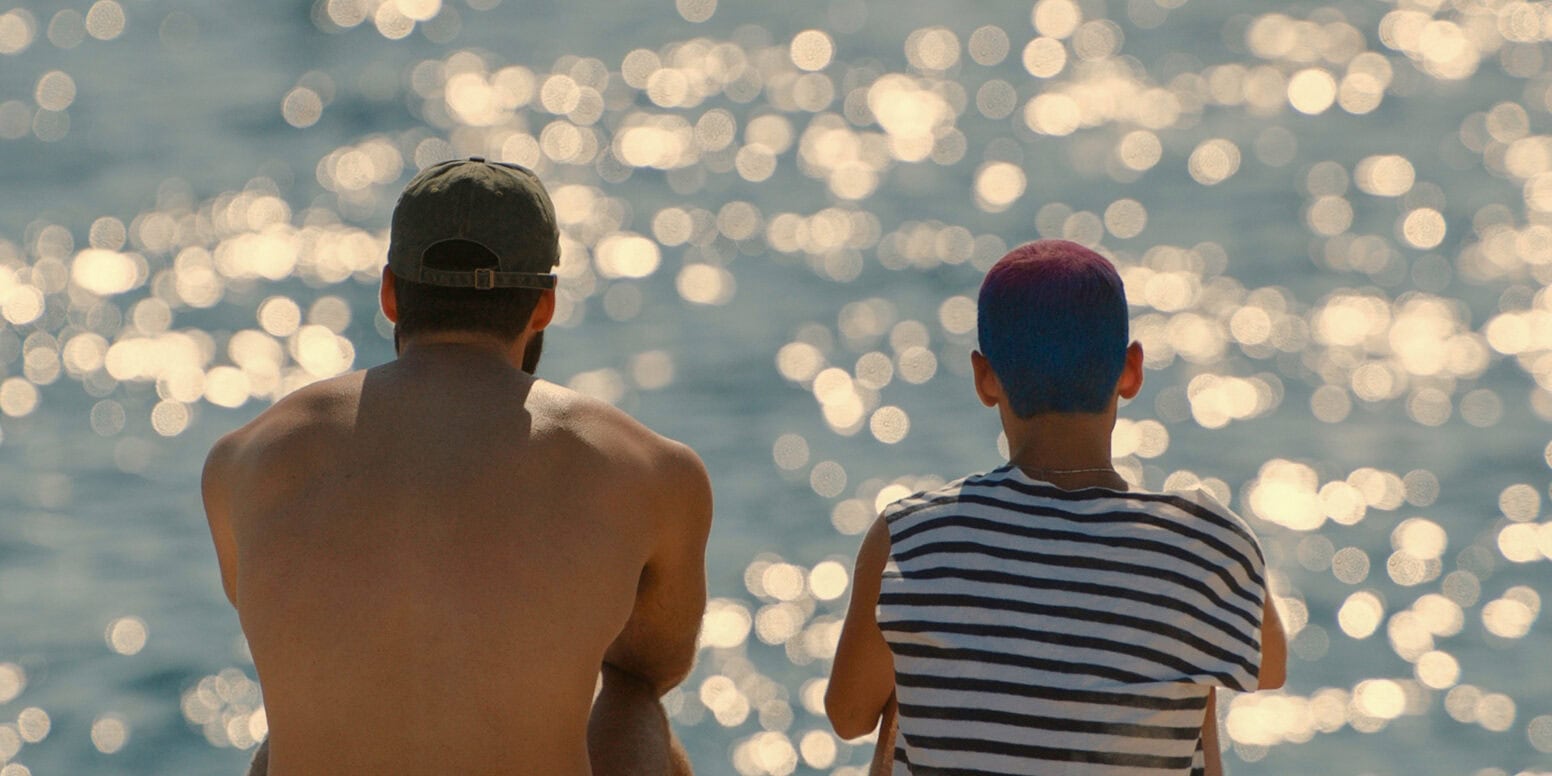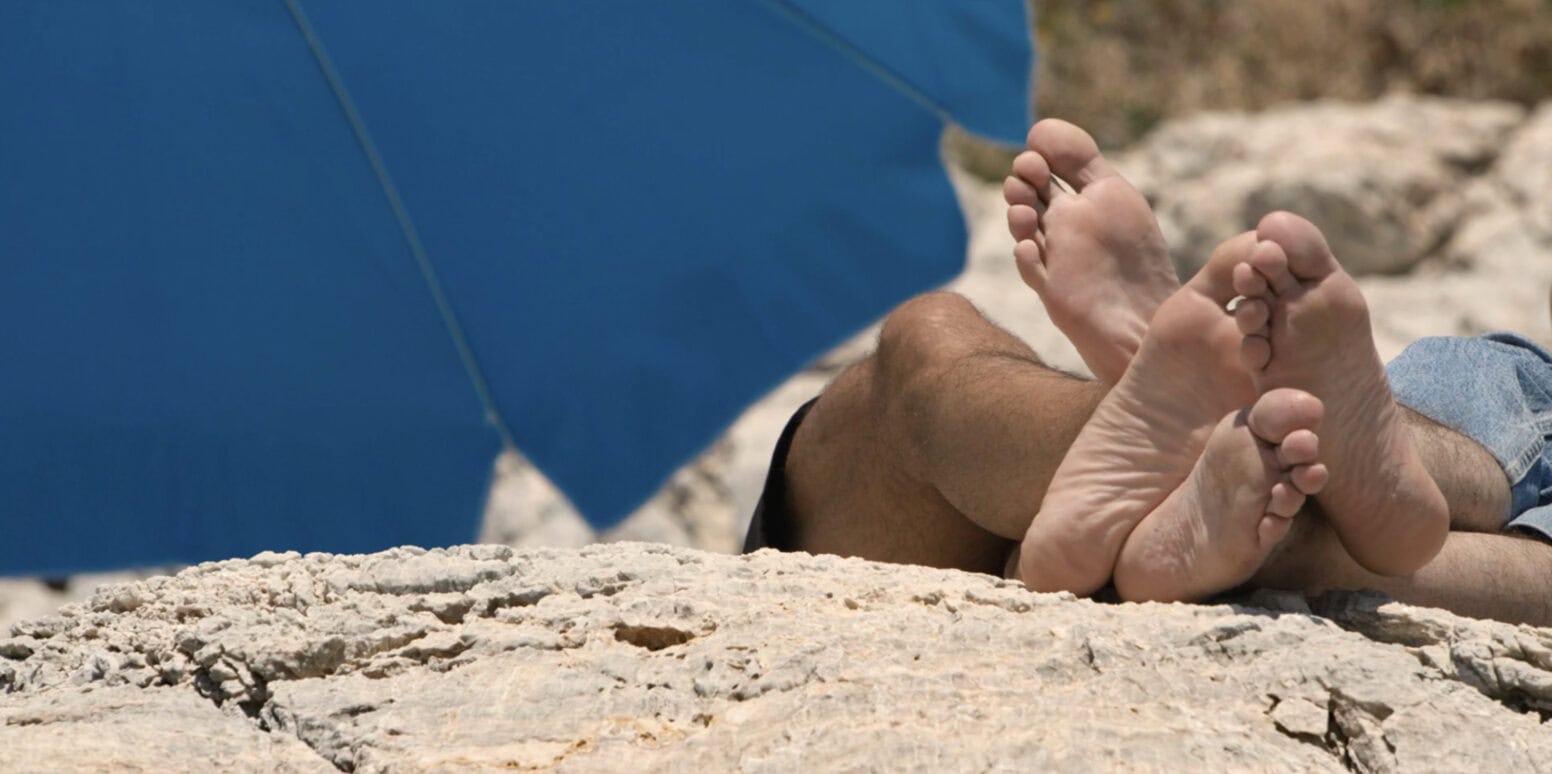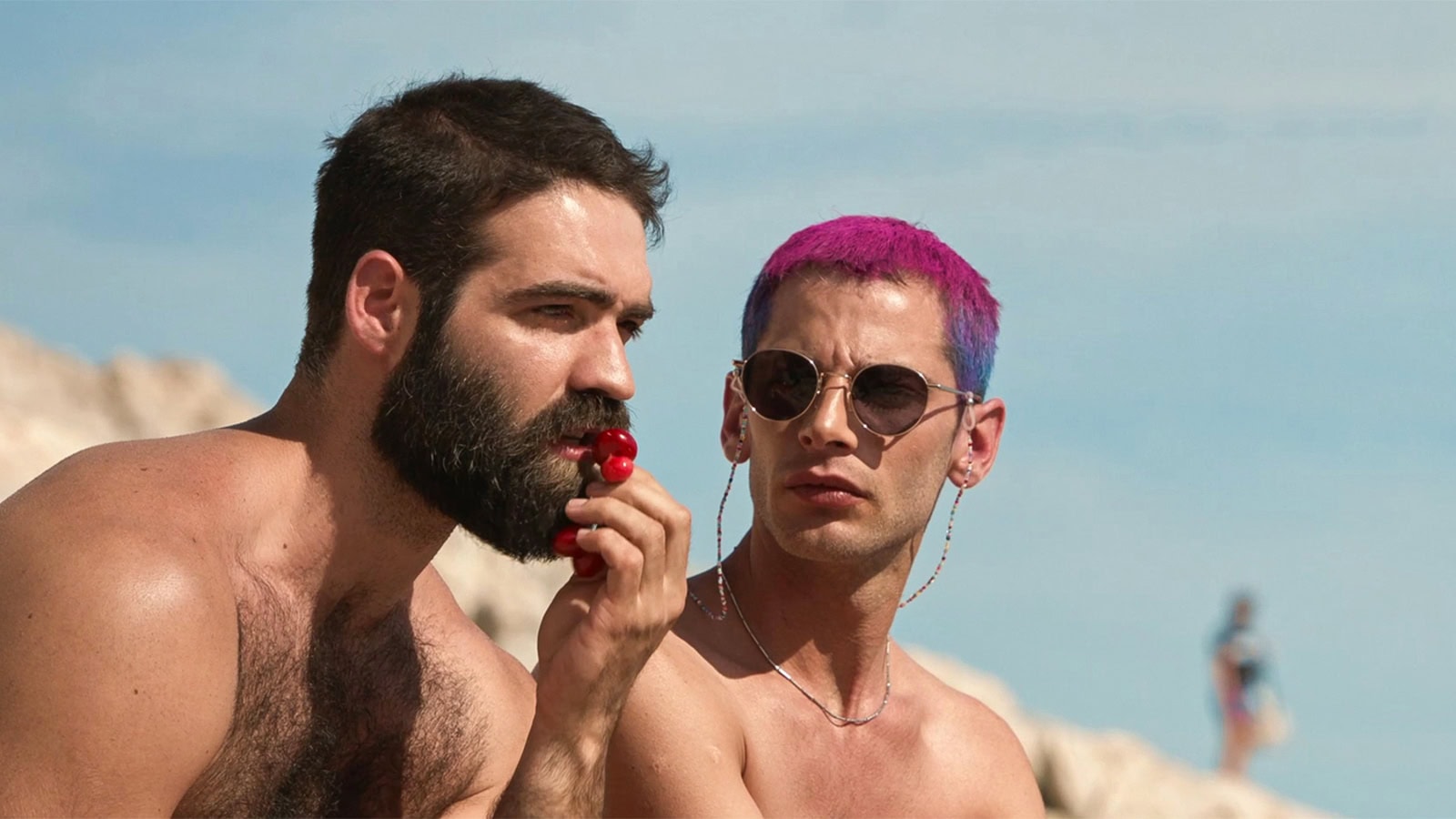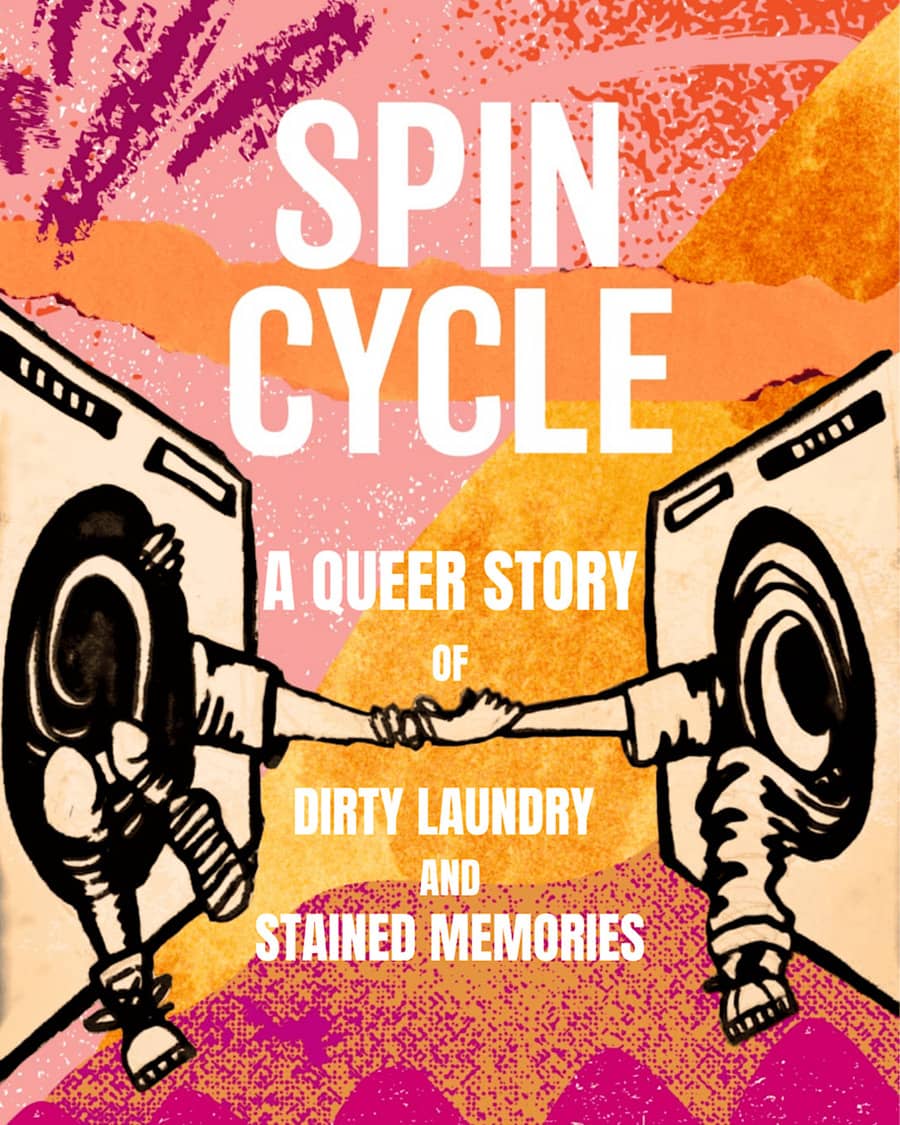In this sexy, sun-drenched Greek comedy, besties Demos and Nikitas are about to embark on the most meta movie adventure ever. They’re making a film about the summer that turned their lives upside down – the one where Demos was dumped by boyfriend Panos and left to co-parent his dog, Carmen. As they dive into writing their masterpiece, Demos and Nikitas discover that sometimes the best love stories aren’t romantic at all! QX spoke to director Zacharias Mavroeidis and lead actor Yorgos Tsiantoulas (Demos) about making the film, gay sex in Greece and their future projects.
The film is a warm celebration of platonic gay friendship. Demos and Nikitas share great chemistry; how did you come to cast the two actors?
Zacharias Mavroeidis: In casting, I collaborated with casting directors Akis Gourzoulides and Sotiria Marini. We made a first round of meetings with actors that could play either of the two parts, where we presented the premise of the film and talked about the queer and nudity elements in it. It was crucial to know that any actor involved in the filmwould feel comfortable with both of these things. Giorgos was an easy decision to make. However, we couldn’t be sure he would actually take the part unless we found the right match. By trying Giorgos with different actors for the part of Nikitas we explored variations of the friendship that lies in the heart of the film. It was Andreas Lambropoulos who gave the most sharp and independent counterpart to Giorgos. If their chemistry wasn’t right, the whole film would have fallen apart.

The Summer With Carmen is also very sexy. There’s lots of male nudity and gay sex. Much of the sex in the film is quite public. Is Greece a very open society when it comes to gay sex?
Yorgos Tsiantoulas: Greece has come a long way in LGBTQ+ rights, especially with the legalization of same-sex marriage in 2024—the first Orthodox-majority country to do so. It was a huge step forward and a sign of how attitudes are shifting. In cities like Athens and Thessaloniki, there’s a vibrant queer community, with Pride events, LGBTQ+ spaces, and growing acceptance. Of course, like anywhere, things can be more conservative in smaller towns or religious circles, and public affection—whether same-sex or opposite-sex—is generally more low-key in Greek culture. But overall, the country is moving forward, and more people feel free to be themselves.
The film’s pace reflects summer days on a beach in Greece, and it’s a great excuse to reflect on gay friendship and time spent together. Scenes recounting the breakup with the boyfriend, the arrival of the dog, the difficult mother, and the father’s death provide the film’s action. Nikita’s hair isn’t dyed for those scenes which was a clever distinguishing feature. Who came up with that idea?
Zacharias: It was something that we decided with Ioanna Lygizou, the hair and make up artist of the film. This dye helps differentiate between past and present narrative time but also suggest the journey Nikitas has made during this narrative time, from an actor in distress to an ambitious filmmaker.

Besides the ex and the parents, much of the attention is on Carmen, the dog. A very cute dog. Was the dog always so well behaved?
Yorgos: Ah, Carmen—well, Nala, her real name actually! She was such a star, but at first, she was a little afraid of me.I think my size threw her off, and she’d keep her distance, just watching me like she was trying to figure me out. But little by little, she warmed up. I started giving her treats, spending time with her between takes, and soon enough, she was completely comfortable—even coming to me on her own. By the end, we had our own little bond. She had such a big personality for such a small dog—stubborn when she wanted to be, but also playful and full of charm. Honestly, she knew she was the real star of the film.
How difficult was it to get the project off the ground, into production and distributed?
Zacharias: The project was originally conceived as a low budget film, in order to be able to produce it only with the small amount of money that can be acquired by Greek national funds. However, I believe that the queerness of the film would have been an obstacle if I didn’t have a solid record of work. Premiering in Venice Festival was crucial to the film’s international career run by our sales agent Be for Films.
Why do you think low-budget European films work so well when they don’t have the big bucks of American blockbusters?
Zacharias: Cinema is a very varied art, from no- budget film to billions-of-budget films. In any case, the means are an essential element of the artwork itself. The more money you have, the more people will have a say on the project and expect a certain outcome. What you gain with low-budget is freedom of artistic expression, but, at the same time, this expression is strictly framed by your limited resources. Shooting the beach scenes we had no budget for anything more than a camera fixed on a tripod with a zoom lenses and a tight 5 days shooting schedule for what account for 1/3 of the running time of the film.

Do we need to celebrate European films more at the cinema?
Zacharias: Cinema-going is at a transitional phase once again, since the establishment of platforms. I think there is an inherent value in watching a film in a cinema, along with strangers, that will keep theatres alive. But it’s true that theatrical distribution needs to reinvent itself. Meanwhile, I think there is all so much film and tv content created that the audience is saturated. There are too many platforms, apps, channels that fight for our attention and I think this will have consequences in the near future, both on the content – produce what can catch the attention – and on the audience feeling exhausted by the never ending fomo.
What other projects do you have in the pipeline?
Zacharias: I am now working on a crime drama, set in rural Greece, hopefully to start financing in 2025.
Yorgos: I’m really excited about what’s next. I’ve recently joined Greensmith Artists, and we’re working on some great new projects. I can’t share details yet, but they’re pushing me in new directions, which is exactly what I love. It’s a different energy from The Summer with Carmen, but that’s the fun part—always evolving, always exploring.
The Summer With Carmen is in selected cinemas nationwide and will be available on digital platforms as well as DVD/blu-ray release on 31 March 2025.
All images supplied.











![All Day Cabaret at Halfway To Heaven LGBTQ] Bar in Central London.](https://www.qxmagazine.com/wp-content/uploads/2025/02/imageedit_2_7533265827-728x410.jpg)







